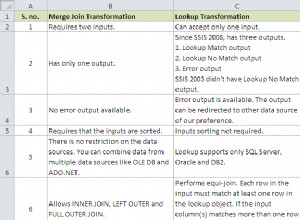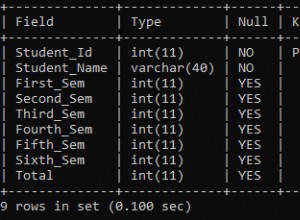Devo ammettere, mysqli_query() l'immissione manuale non contiene un esempio chiaro su come recuperare più righe. Può essere perché la routine è così di routine, nota alla gente di PHP da decenni:
$result = $link->query("DESCRIBE students");
while ($row = $result->fetch_assoc()) {
// to print all columns automatically:
foreach ($row as $value) {
echo "<td>$value</td>";
// OR to print each column separately:
echo "<td>",$row['Field'],"</td><td>",$row['Type'],"</td>\n";
}
}
Nel caso in cui desideri stampare i titoli delle colonne, devi prima selezionare i tuoi dati in un array nidificato e quindi utilizzare i tasti della prima riga:
// getting all the rows from the query
// note that handy feature of OOP syntax
$data = $link->query("DESC students")->fetch_all(MYSQLI_ASSOC);
// getting keys from the first row
$header = array_keys(reset($data));
// printing them
foreach ($header as $value) {
echo "<td>$value</td>";
}
// finally printing the data
foreach ($data as $row) {
foreach ($row as $value) {
echo "<td>$value</td>";
}
}
Alcuni host potrebbero non avere il supporto per fetch_all() funzione. In tal caso, compila il $data array nel solito modo:
$data = [];
$result = $link->query("DESC students");
while ($row = $result->fetch_assoc())
{
$data[] = $row;
}
Devo aggiungere due note importanti.
-
Devi configurare mysqli per generare automaticamente errori invece di controllarli manualmente per ogni istruzione mysqli. Per farlo, aggiungi questa riga prima
mysqli_connect():mysqli_report(MYSQLI_REPORT_ERROR | MYSQLI_REPORT_STRICT); -
La nota più importante: a differenza di
mysql_query(),mysqli_query()ha un uso molto limitato. Puoi utilizzare questa funzione solo se non verranno utilizzate variabili nella query. Se verrà utilizzata una variabile PHP, non dovresti mai usaremysqli_query(), ma attenersi sempre alle dichiarazioni preparate , in questo modo:$stmt = $mysqli->prepare("SELECT * FROM students WHERE class=?"); $stmt->bind_param('i', $class); $stmt->execute(); $data = $stmt->get_result()->fetch_all();
È un po' prolisso, devo ammettere. Per ridurre la quantità di codice è possibile utilizzare PDO o adottare una semplice funzione di supporto per svolgere tutte le attività di preparazione/associazione/esecuzione all'interno di:
$sql = "SELECT * FROM students WHERE class=?";
$data = prepared_select($mysqli, $sql, [$class])->fetch_all();




